Overview
The article provides a comprehensive step-by-step guide on how to evaluate franchise opportunities, emphasizing key factors such as market demand, company history, and financial aspects, which are crucial for making informed investment decisions. By detailing these elements, including the importance of understanding initial and ongoing costs as well as the role of training and support, the article equips potential franchisees with the necessary tools to assess the viability and potential success of a franchise venture.
Introduction
Navigating the world of franchising can be both exciting and daunting, especially for those looking to make a significant career transition. With a myriad of opportunities available, understanding the key factors that contribute to successful franchise ownership is essential. From evaluating market demand and financial aspects to assessing the support systems provided by franchisors, aspiring franchisees must approach their decision with careful consideration.
As the industry evolves, particularly with the integration of technology and changing consumer behaviors, staying informed about the landscape is crucial. This article delves into the critical elements to evaluate when exploring franchise opportunities, offering insights that can empower individuals to make informed choices on their franchising journey.
Key Factors to Consider When Evaluating Franchise Opportunities
When evaluating business opportunities, it’s essential to consider several critical factors that can significantly influence your success:
- Market Demand: Begin by analyzing the demand for the business’s products or services in your target market. Conduct thorough market research to comprehend current trends and consumer needs. Significantly, the U.S. Census Bureau indicates that franchised establishments make up over 11% of all enterprises with paid employees across a diverse range of 295 industries, underscoring the substantial market presence of such operations. Additionally, it’s important to note that one in twelve Americans in the private sector works in a franchise business or has a job because of franchising, which underscores the significance of understanding how to evaluate franchise opportunities.
- Company History: Investigate the parent company’s background, focusing on their years in operation, growth trajectory, and any legal challenges they have faced. A solid track record can be a strong indicator of stability and reliability.
- Assistance Systems: Evaluate the aid provided by the franchisor, encompassing training programs, marketing initiatives, and ongoing operational assistance. Robust networks can aid your shift into the business and contribute to long-term success.
- Competition: Analyze the competitive landscape within your chosen sector. Identify how the business distinguishes itself from its competitors and what unique selling propositions it offers to consumers.
- Franchisee Satisfaction: Gather insights from current and former franchisees regarding their experiences. Understanding how to evaluate franchise opportunities can provide a clearer view of the franchisor’s assistance and the overall system.
- Alignment with Personal Goals: Reflect on whether the business opportunity aligns with your personal interests, values, and long-term career aspirations. A business model that resonates with your passions can enhance your commitment and satisfaction in the venture.
As we look toward 2024, the franchising industry is preparing for growth by focusing on technological innovations, particularly the adoption of Artificial Intelligence (AI) to improve operational efficiency and redefine customer experience strategies. This shift emphasizes the growing importance of online visibility, especially since over 28.8% of businesses have transitioned online post-COVID-19. Keeping an eye on market dynamics and consumer behavior will be crucial in navigating potential challenges and maximizing your success in the franchising landscape.
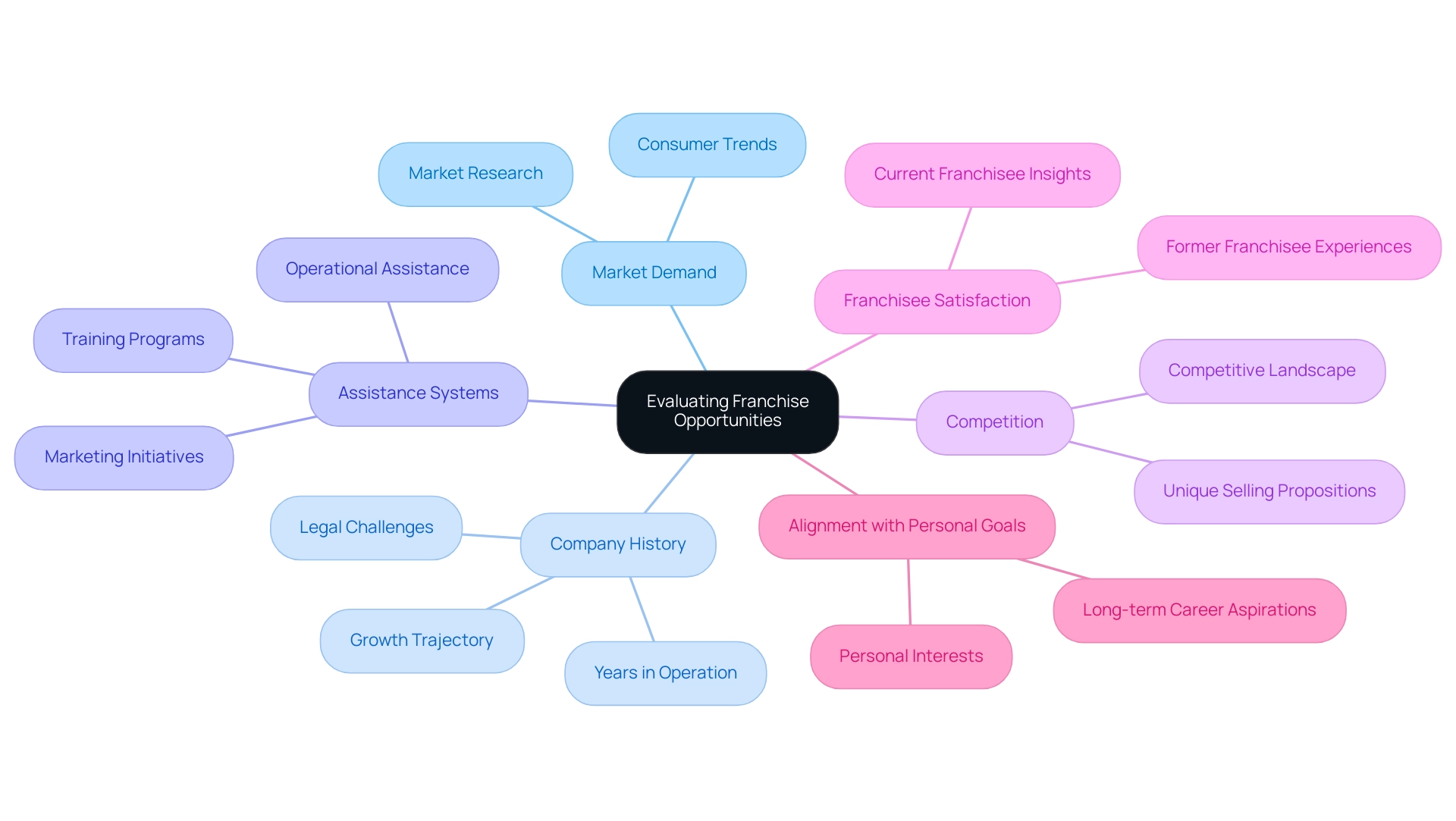
Understanding the Financial Aspects of Franchise Investments
Comprehending the financial elements of business investments is essential for aspiring owners. Here are the key components to consider:
-
Initial Costs: Determine the total initial investment required, which typically includes licensing fees, equipment, inventory, and real estate expenses.
For instance, N-Hance Wood Refinishing has a total investment range from $70,695 to $194,995, illustrating the variability in initial costs across different franchises.
-
Ongoing Fees: It is essential to familiarize yourself with ongoing fees associated with business agreements. These may include royalty payments, marketing contributions, and various operational costs.
According to recent data, ongoing fees can range from 4% to 8% of gross sales, depending on the business model. Understanding these recurring expenses will assist you in evaluating franchise opportunities effectively.
-
Return on Investment (ROI): Estimating potential ROI is vital.
Analyze projected revenues, profit margins, and break-even points. Employ financial models to forecast earnings over time, enabling you to gauge the financial viability of your investment. Rod Clough, President of HVS Americas, underscores this need, stating,
Hotel licensing fees are the compensation paid to the licensees for the use of the chain’s name, logo, identity, image, goodwill, procedures and controls, marketing, and referral and reservation systems.
This insight reflects the importance of evaluating what you gain in return for your investment, particularly how licensing fees can impact your overall ROI.
-
Funding Options: Consider various funding avenues such as personal savings, loans, or investment partners to finance your business. Each option has its own benefits and risks, and understanding these will empower you to make informed financial decisions.
Additionally, franchisors typically require a minimum cash amount and can assist in determining the necessary working capital for initial operating expenses.
-
Financial Projections: Finally, request and rigorously review the franchisor’s financial performance representations (FPR). Determine how to evaluate franchise opportunities by assessing their accuracy in reflecting potential earnings to ensure realistic expectations.
Recent reports emphasize the necessity for thorough due diligence in assessing initial costs and ongoing fees, which are crucial in today’s changing business landscape.
As demonstrated by the Woodhouse Day Spa, which has an estimated initial investment ranging from $1,231,617 to $1,833,067 and continues to broaden its luxury offerings across the U.S., comprehending these financial aspects is vital for successful ownership.
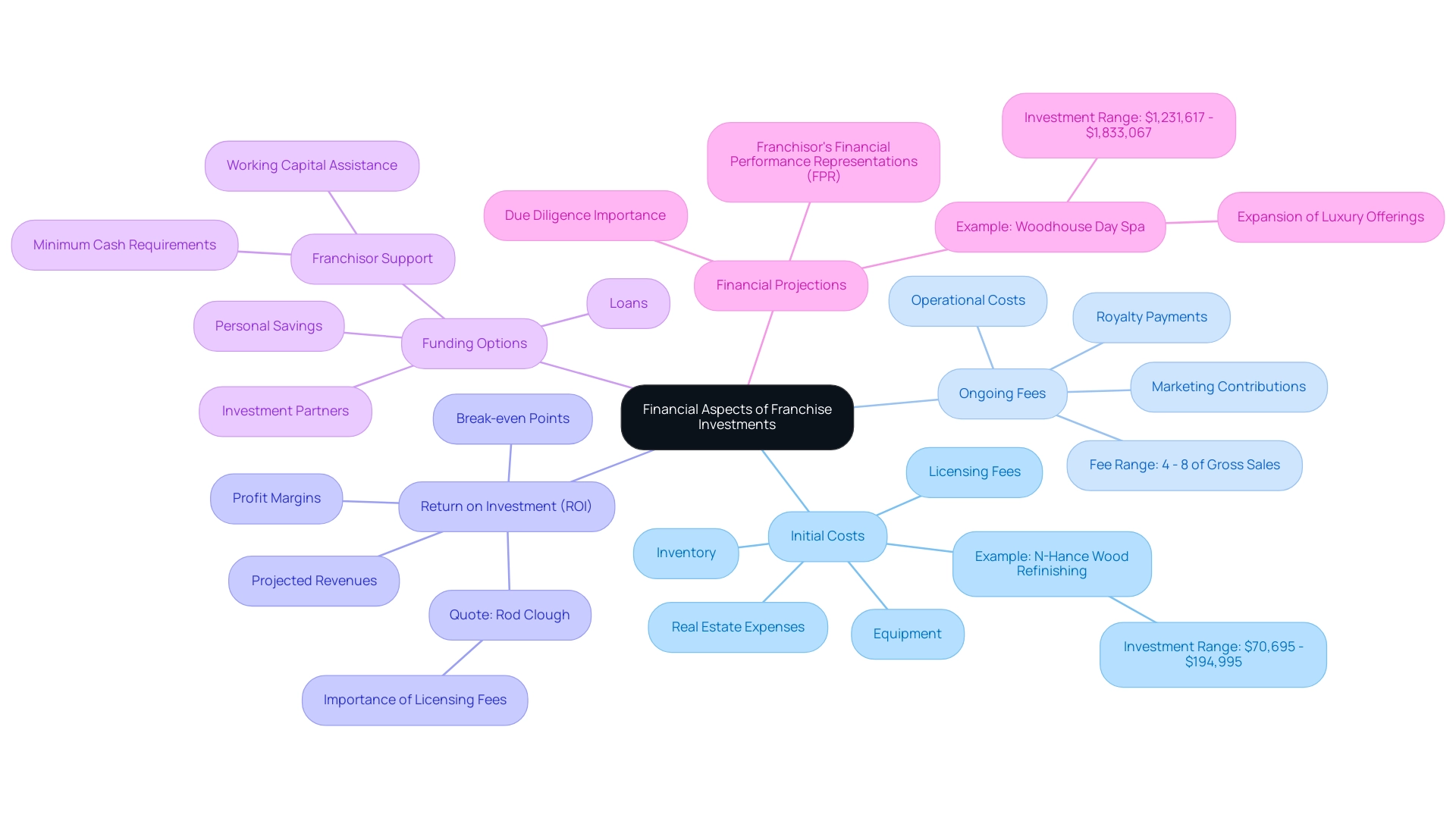
The Role of Training and Support in Franchise Success
The role of training and support in franchise success is pivotal, encompassing several key elements:
- Initial Training: Understanding the franchisor’s initial training program is essential. Evaluate factors such as the duration, content, and delivery methods. A comprehensive initial training program lays the groundwork for your business operations, ensuring you are well-prepared to manage your enterprise from day one.
- Continuous Assistance: Continuous assistance mechanisms are crucial for long-term success. Assess the availability of field visits, online resources, and troubleshooting assistance. For example, organizations such as Ninja Nation, founded in 2017, are recognized for their strong assistance networks. Lucas Clarke notes, “The financial advantages of selecting a Ninja Nation business are also significant.” This support not only helps you resolve immediate challenges but also fosters a sense of community among franchisees.
- Mentorship Opportunities: Seek out ways to connect with seasoned franchisees for mentorship and guidance. Interacting with seasoned mentors can offer invaluable insights into best practices and strategies for overcoming common challenges in your business journey.
- Operational Manuals: Ensure that operational manuals are readily available. These documents detail essential procedures, standards, and best practices, acting as a crucial resource for new franchisees navigating the complexities of their operations.
- Continuous Improvement: Inquire about programs designed for continuous improvement. As the business landscape evolves, ongoing training updates are essential to keep your company competitive. Staying informed about the latest developments, especially in 2024, can significantly enhance your operational effectiveness.
By concentrating on these aspects of training and assistance, you can gain insights on how to evaluate franchise opportunities to position yourself for success in your franchising venture. The financial advantages of franchises like Ninja Nation, which is currently expanding with two new locations in Phoenix, Arizona, further illustrate the profitability potential when you leverage these support systems effectively.
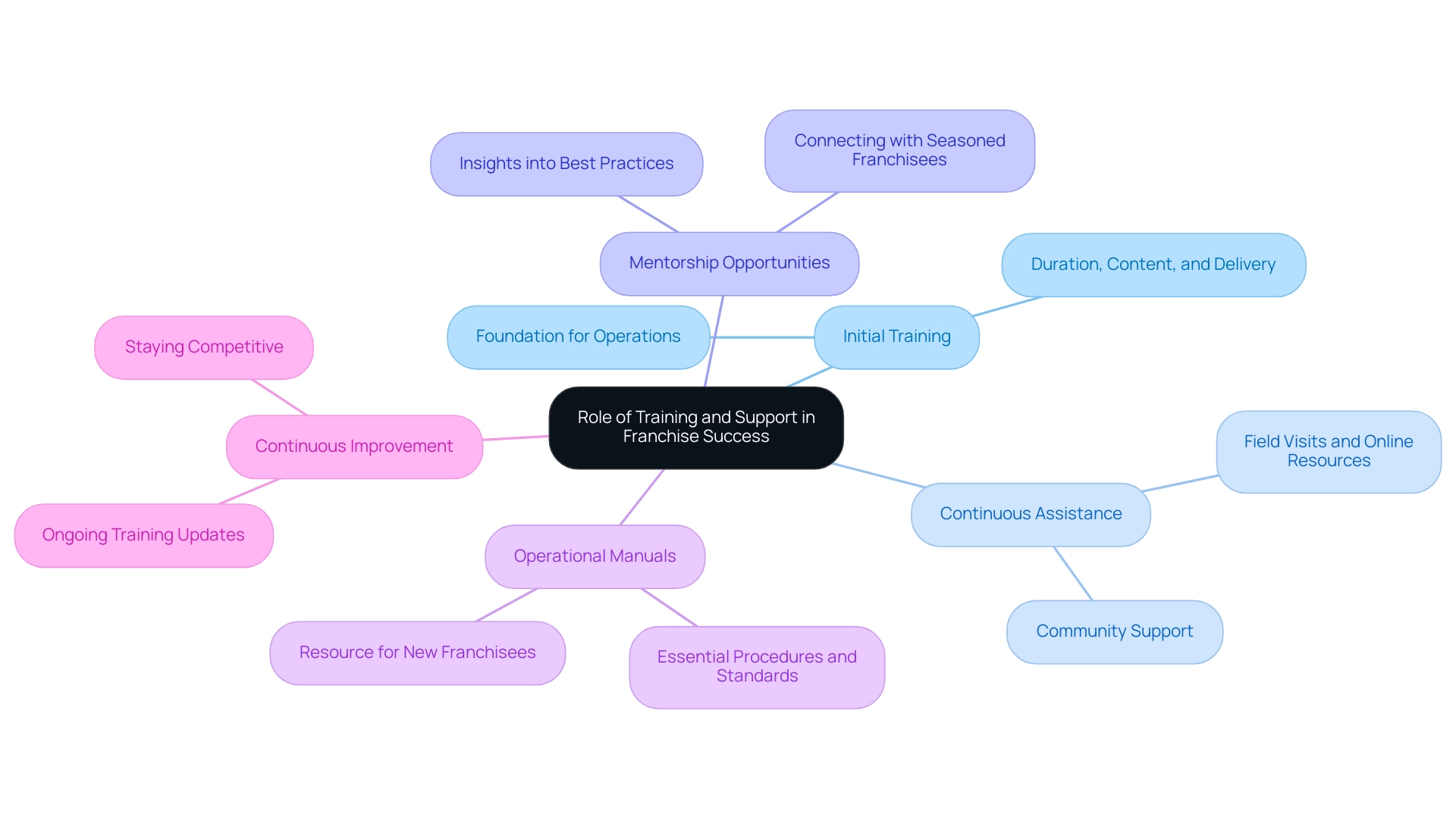
Evaluating the Franchisor’s Reputation and Market Position
To effectively assess a franchisee’s reputation and market position, consider the following steps:
-
Research Online Reviews: Utilize trusted platforms such as Franchise Direct and the Better Business Bureau to read reviews and ratings from current franchisees and customers. These insights can reveal the experiences of others and provide a clearer picture of the company’s standing.
- Industry Recognition: Investigate any awards or accolades the franchise owner has earned within the sector. Recognition from industry organizations often signifies a positive reputation and can enhance the credibility of the brand.
-
Market Share: Analyze the franchisor’s market share and growth trends. A strong market position often correlates with stability and a proven commercial model, making it a crucial factor in your evaluation. Significantly, chains typically surpass the yearly income of independent enterprises by approximately $2 million each year, suggesting a robust financial standing that could have a favorable impact on the franchisor.
-
Employee Benefits: Consider the advantages provided to employees within the business system. For instance, employees of franchise businesses earn up to 3.4% more and have better access to health insurance (65%) and paid leave (76%). These factors can reflect the business owner’s commitment to its workforce and overall operational quality.
-
Legal History: Conduct a thorough review of the entity’s legal history, including any disputes or litigation. This can serve as a red flag, indicating potential issues that may affect your investment and operational success.
-
-
Networking: Engage with the business community by attending expos and industry events. Connecting with current franchisees can offer valuable firsthand insights about the business and assist you in making a knowledgeable decision. A prime example of successful business ownership is Greg Flynn, the world’s largest operator, who manages over 2,600 restaurants across various brands, showcasing the potential scale and impact of a reputable brand partner.
By following these steps, you will be better equipped to assess the brand partner’s reputation and market position, ultimately guiding your decision in the business journey.
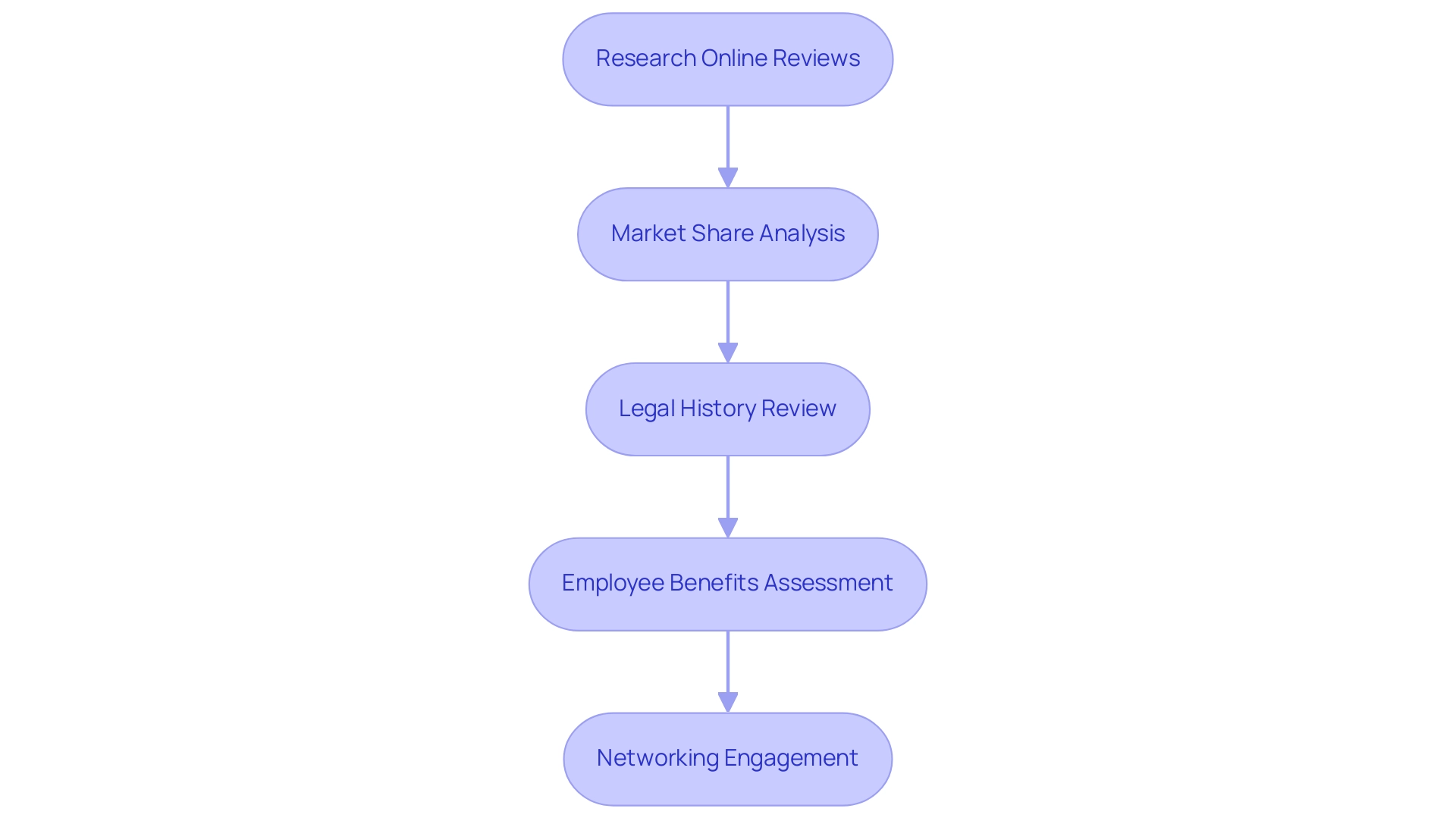
Planning for the Future: Exit Strategies and Franchise Agreements
Planning for your future as a franchisee requires a strategic approach that includes understanding how to evaluate franchise opportunities.
Understanding Business Agreements: It is essential to conduct a thorough review of your business agreement. Focus particularly on the terms regarding fees, obligations, and your rights as a franchisee.
This knowledge is foundational for understanding how to evaluate franchise opportunities and making informed decisions about your investment.
Exit Strategies: Crafting a well-defined exit strategy is crucial. Consider your options for selling the business or transferring ownership, ensuring you have a roadmap that aligns with your long-term objectives.
As Jeffrey Gitomer aptly states,
There is no good time to buy a business, only your time.
Recognizing when it’s your time to exit is just as important. Additionally, being aware of current challenges, such as the fact that labor costs and quality remain a top challenge for 34% of business operations, can inform your exit strategy.
Legal Considerations: Engaging a legal advisor is a necessary step. They can assist you in navigating the intricacies of the agreement and clarify any legal obligations that may impact your exit strategy.
Contingency Planning: Life can be unpredictable, which is why establishing contingency plans is vital.
Outline the steps you will take if you decide to leave the business, ensuring you are prepared for unexpected circumstances.
Long-term Goals: Finally, align your investment with your long-term career and financial aspirations. Your selection of business opportunity should support your overall goals, ensuring that your path leads to fulfillment and prosperity.
As you consider how to evaluate franchise opportunities, keep in mind that the business landscape is evolving. For instance, the Southeast region accounts for 30% of the total U.S. franchised businesses, employing 2.6 million people and generating $268.2 billion in revenue. Additionally, the urgent care industry is anticipated to grow at a remarkable compound annual growth rate of 9.7% over the next five years, indicating significant opportunities for profitability.
This growth underscores the importance of being strategic about not just entering the franchise world, but also planning your exit effectively.
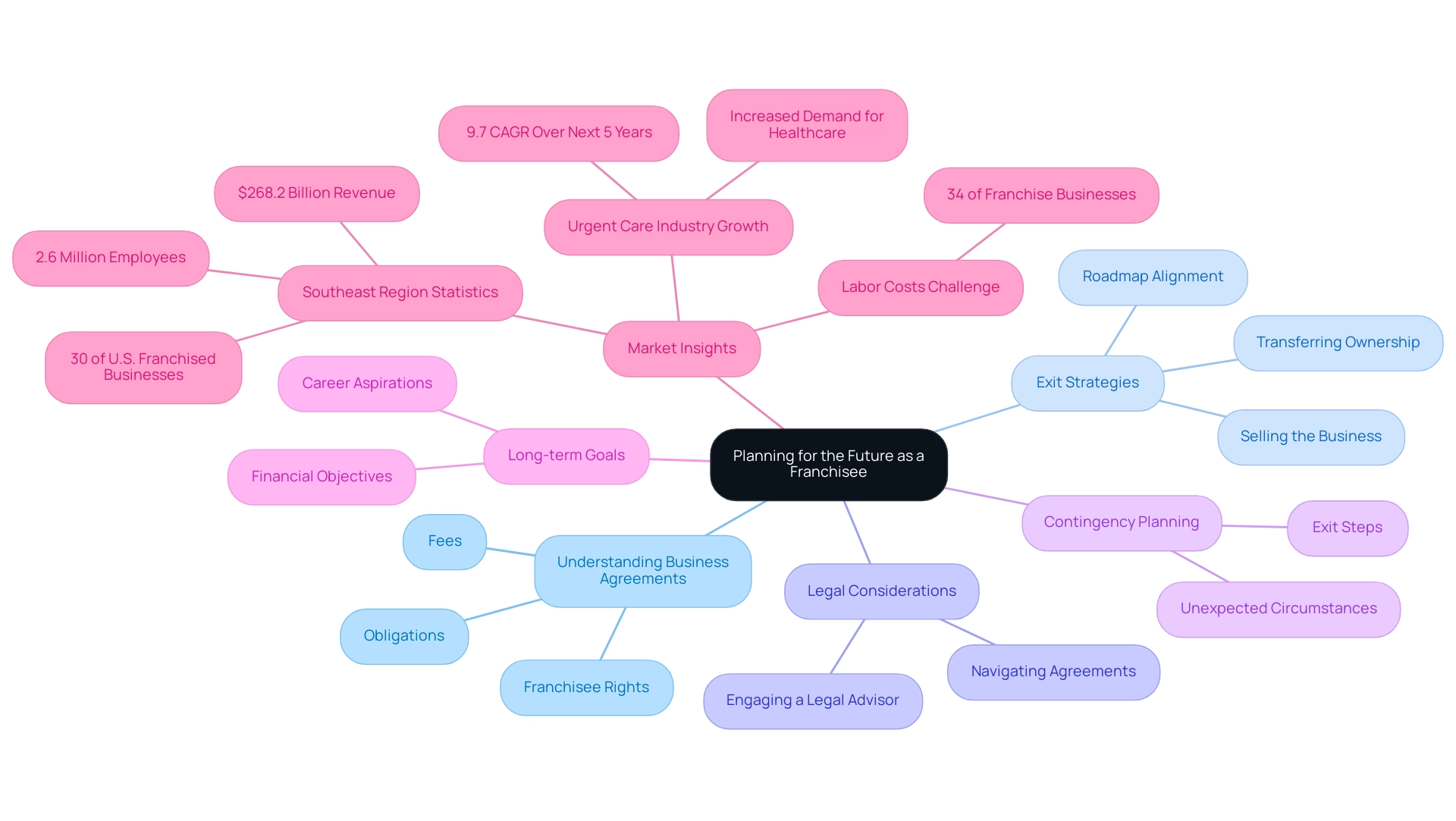
Conclusion
Evaluating franchise opportunities requires a multifaceted approach that encompasses:
- Market demand
- Financial considerations
- Support systems
- The reputation of the franchisor
By conducting thorough market research, aspiring franchisees can identify trends and consumer needs, ensuring they select a franchise with a solid foundation. Understanding the financial aspects, including initial costs and ongoing fees, is crucial for budgeting and forecasting potential returns on investment.
Furthermore, the role of comprehensive training and ongoing support from franchisors cannot be overstated; effective training programs and mentorship opportunities can significantly enhance a franchisee’s chances of success. Evaluating the franchisor’s reputation through online reviews, industry recognition, and networking within the franchise community will provide deeper insights into the potential of the franchise.
Finally, planning for the future is essential, including understanding franchise agreements and developing exit strategies. By considering these critical factors, individuals can make informed decisions that align with their personal goals and aspirations. The franchising landscape is ripe with opportunities, and with careful planning and research, aspiring franchisees can navigate this exciting journey toward successful franchise ownership.


